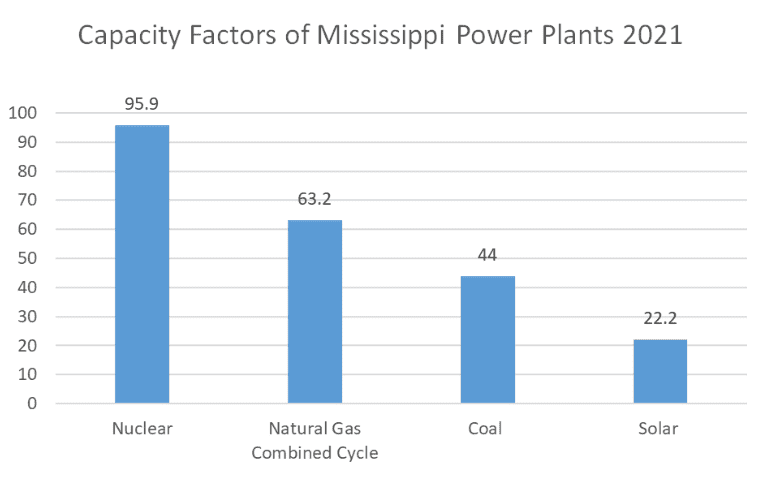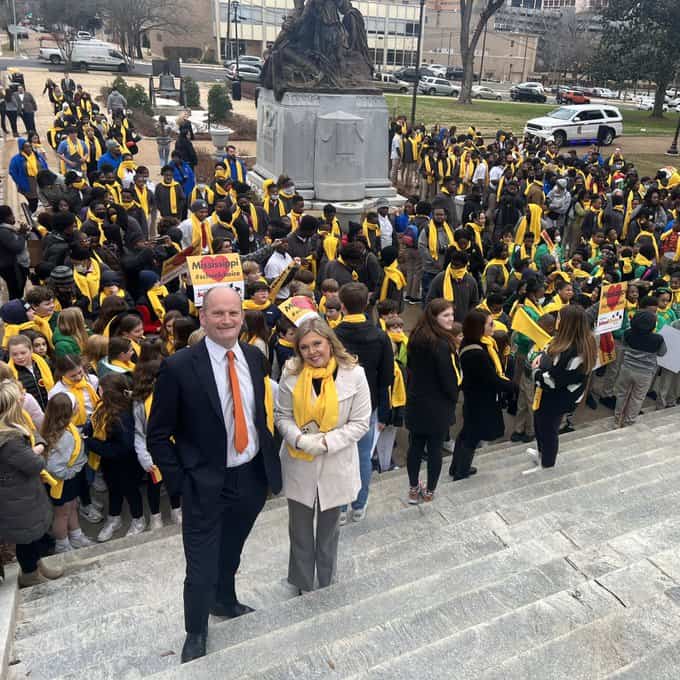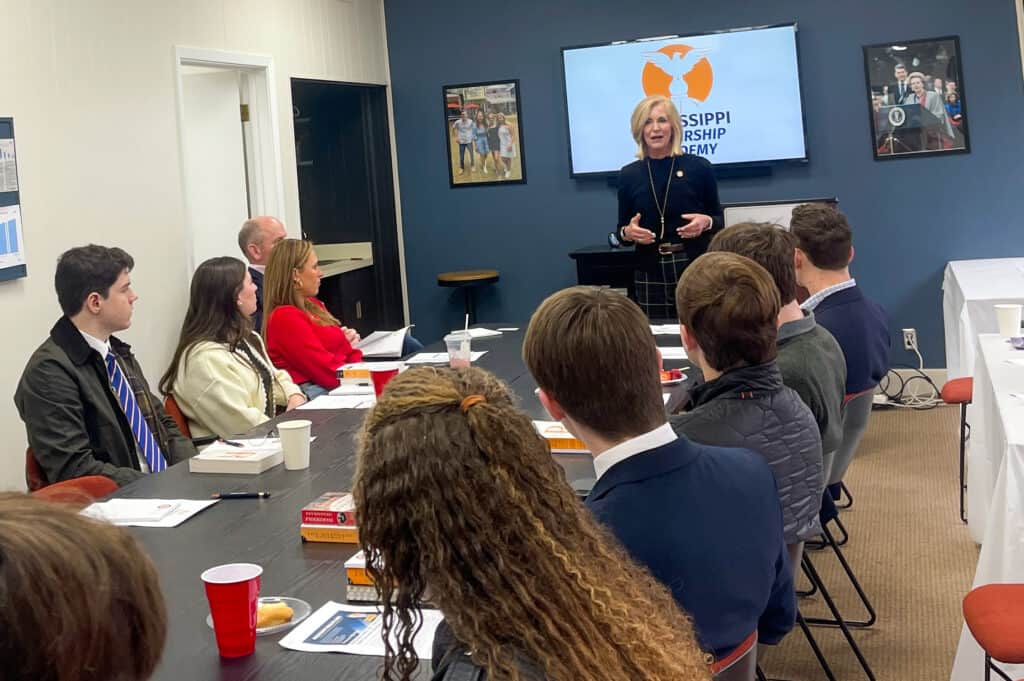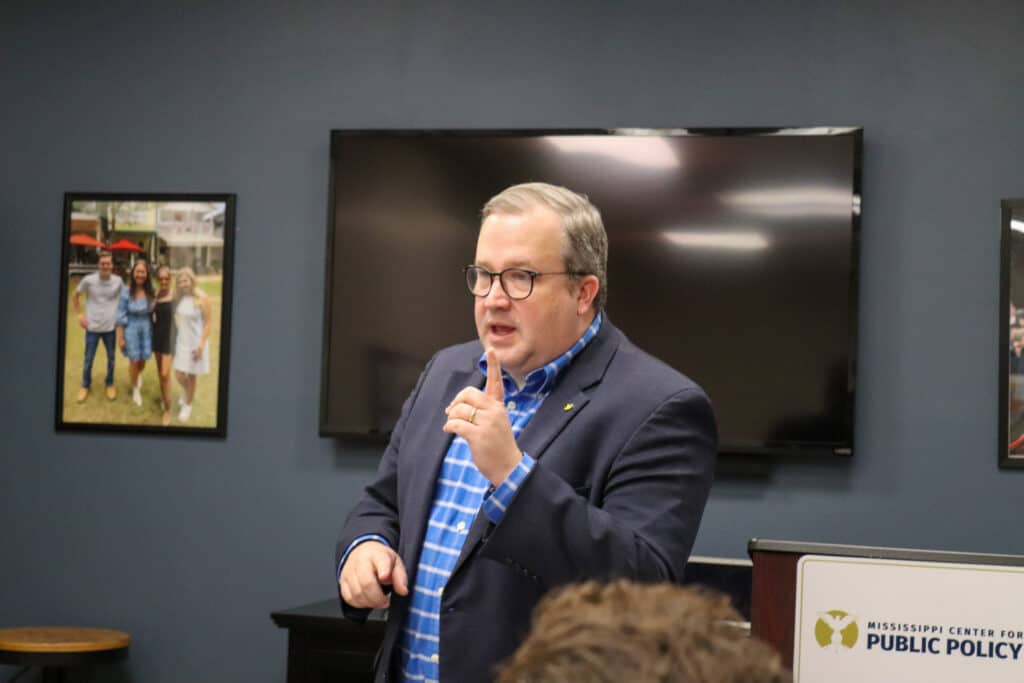Tuesday was the first deadline day in the Mississippi Legislature. For any general bill to potentially become law, it had to pass out of its original chamber's committee, or else it died!
The great news is that some of our bills made it!
OUR AGENDA
A bill to combat ESG in Mississippi PERS
In an effort to maximize returns to our state's public servants, MCPP created a coalition amongst the Mississippi Bankers Association, the State Treasurer's Office, the State Attorney General's Office and ourselves to clarify the fiduciary duty of the Mississippi Public Employees' Retirement System Board.
SB 2849 from Sen. Chad McMahan ensures the board invests the state's pension funds in a manner that prioritizes the safety and highest return on investment rather than on environmental, social and governance causes. This bill has passed out of the Senate Finance committee and is on the calendar to be discussed on the Senate floor.
Municipal Recall
HB 370 from Rep. Shanda Yates would give local residents the power to remove locally elected officials when they fail. Too many mayors in our state are not effectively accountable outside of election time, and we feel this bill would allow citizens to take a stand against neglectful politicians.
This bill was discussed a few weeks ago on the House floor but has since been subject to call.
Deficit Reporting Bill
SB 2053 from Sen. John Polk ensures that state agencies better manage their budgets. A new requirement to report deficits in a timely manner would enable our state officials to operate their overall budget in a more financially responsible and accountable way.
This bill passed out of committee and will head to the Senate Floor.
Several other bills made it out of committees in both chambers over the past week that we feel represent positive, conservative change in Mississippi.
GOOD POLICY IN THE STATE
HB 1317 from Rep. Lee Yancey authorizes pharmacists to test or screen for and administer treatment for minor, non-chronic health conditions. This would reduce delays and costs for patients.
HB 1150 from Rep. Randy Boyd authorizes state institutions of higher learning and community and junior colleges to authorize charter schools. This would allow more charter schools to open, progressing educational prosperity for children of our state.
HB 1045 from Rep. Jill Ford provides that library books and collections aimed at children and teenagers shall not be allowed to include sexual or explicit materials.
SB 2338 from Sen. Joel Carter ensures just, reasonable and transparent billing in municipal waterworks. This legislation bases water bills on usage rather than property value.
SB 2054 from Sen. Kevin Blackwell provides for the removal of appointed state officers for certain forms of willful neglect. If the Governor, State Auditor, House of Representatives or Senate feels an appointed member of a state board or agency has not properly fulfilled their administrative duty, they can file a complaint of neglect.
HB 729 from Rep. Kent McCarty establishes The "Mississippi Successful Techniques Resulting In Delivering Excellence In Education And Employability (STRIDE) Scholarship Program." This bill would make scholarships available to students who become eligible to participate in dual-enrollment courses.
In August 2022, President Biden signed the so-called “Inflation Reduction Act,” a $370 billion spending package that will do little to reduce inflation, but it will do a lot to subsidize solar power production. Unfortunately, these subsidies will lead to market distortions that will increase the cost of electricity for Mississippi families and businesses.
The biggest problem with subsidies is that they incentivize rational actors to do irrational things.
In this case, the Inflation Reduction Act provides a 30 percent Investment Tax Credit (ITC) for solar that will incentivize Magnolia-state electric companies to build facilities that otherwise would not make sense from a business standpoint.
To understand why it is irrational to subsidize solar, it helps to understand some basic facts about how this technology works.
A solar power facility, often referred to as a solar “farm” because of the large amount of land required for utility-scale electricity production, is referred to by its maximum capacity – 100 megawatts, for example. That is known as their “nameplate” capacity. But the reality is that power plants rarely operate anywhere near their capacity, and solar plants are among the worst in that regard.
Statistics from the United States Energy Information Administration (EIA) show solar farms in Mississippi only generated about 22 percent of their capacity in 2021. That means a 100 megawatt plant is operating, on average, like a 22 megawatt plant, although customers are paying for a 100 megawatt plant.
This productivity percentage is commonly referred to as a “capacity factor.” The capacity factor of solar facilities in Mississippi compares poorly to other energy sources like nuclear, which produced 96 percent of its potential output in 2021 (though it averaged only 62 percent over the previous five years), natural gas combined cycle plants, which are the most efficient natural gas plants, which produced 63 percent, and coal plants at 44 percent, as shown in the graph below.

Even these data points may overstate the usefulness of solar power because the panels can only produce electricity if the sun is shining, which is obviously beyond our ability as humans to control. On the other hand, the capacity factors of natural gas and coal plants could be improved by simply burning more fuel.
This point is crucial because one of the most important things to know about the electric grid is that electricity is generated to meet demand when that demand occurs .Think about what happens when you turn on a lamp or the air conditioner – you expect, or “demand” electricity to be there.
If demand rises as Mississippi households turn on their air conditioners or heaters, an electric company must increase the supply of electricity on the grid to meet it. Generating more electricity on demand is relatively easy with natural gas power plants and nearly impossible with solar power when the sun doesn’t happen to be shining. This is why natural gas or nuclear power plants must remain online regardless of how many solar panels are built, to ensure the lights stay on when the sun goes down.
Understanding these physical realities is essential for understanding why the Biden administration’s subsidies for solar will ultimately drive up the cost of electricity for Mississippi families and businesses.
Some economists have suggested that utility companies are not truly private companies in the sense that they are government-approved monopolies that have the exclusive right to sell electricity in their service territories. Customers living in those territories are legally obligated to purchase their power from the monopoly.
Because electric companies are monopolies, it would be unfair to allow them to charge whatever they wish, so the price of electricity must be approved by regulators at the state Public Service Commission (PSC) using a formula that allows an electric company to charge enough to cover the cost of providing power plus a government-approved profit, generally between 9 to 10 percent on equity, whenever they build new infrastructure that is approved by the Public Service Commission, whether it be a natural gas plant, a solar plant, or even new corporate offices. They even get reimbursed – and earn a profit from electricity customers – when they buy new furniture!
This regulatory structure means that every dollar spent on new infrastructure will increase electricity rates. This unfortunate reality is compounded by the fact that solar power, which is not available 24 hours a day, cannot replace natural gas plants, meaning that customers will pay for the natural gas plants and the solar plants, not whichever one happens to be lower cost.
The subsidies enacted by the Biden administration will make solar power appear more affordable on paper (never mind that subsidies don’t change the cost of a product or service, merely who pays for it) and this will entice electric companies to build more solar facilities to bolster their bottom lines for their shareholders, even though it would make more sense for ratepayers to utilize the natural gas facilities.
In this instance, it is the job of the Public Service Commissioners to scrutinize proposed projects and protect ratepayers from the rising prices that would accompany the construction of the new solar facilities.
Sadly, the fact that PSC commissioners have approved $1.4 billion in renewable energy projects since 2020—which will necessarily drive up prices— suggests that the PSC commissioners have not put the interests of ratepayers first.
While the subsidy package signed into law by President Biden was called the Inflation Reduction Act, it would be more aptly named the Inflation Production Act because the end result of the solar subsidies will be higher electricity prices for Mississippi families and businesses.
Ten years ago, amid much fanfare, Mississippi’s state legislature passed a law to allow Charter Schools. A decade later, what do we have to show for it? Not much, if we are honest.
So far, a mere eight Charter Schools have been approved across the entire state. Of the 450,000 or so children in public education in our state, a minuscule number are enrolled in Charter Schools.
“Maybe that means there’s not much need for them?” some might suggest. Actually, there’s far greater demand for Charter Schools than there are places available.
Many families in Mississippi are happy with public education as it is – and not only those fortunate enough to live in ‘A’ rated school board districts such as Madison, De Soto or Rankin. The problem is those that are not satisfied. For all the talk about School Choice in our state, right now there are very few dissatisfied moms and dads can do about it unless they are prepared to opt out of public education altogether.
Opting out is precisely what has been happening. Approximately 25,000 schoolchildren have been taken out of the system entirely and are home-schooled. Well over 45,000 are now privately educated.
The precious few Charter Schools we are fortunate enough to have often done an extraordinary job. There just aren’t that many of them.
We have seen pathetically little progress toward school choice in our state – and it is time to be honest as to why.
Mississippi only has a tiny number of Charter Schools not because parents do not want them, but because the administrative state in our state will not permit them. The inappropriately named Charter School Authorizer Board has done a brilliant job of not authorizing Charter Schools. By my count, eight out of ten applications have been rejected.
School choice means much more than Charter Schools. Giving moms and dads the freedom to decide what kind of education best suits their child might mean Charter Schools, but it could mean a micro-school or using open enrollment to switch school districts.
But various attempts to allow open school enrollment between school districts died in committee in the state legislature, the chairman apparently unwilling to allow the issue further consideration. Why? A modest scheme that allows children with special needs a degree of choice has been watered down. Again, we need to ask why?
Conservatives hold a supermajority in our state, for goodness’ sake! So why is the Charter School Authorizer Board that conservatives appoint so unwilling to approve new schools? Why does a state legislature with a conservative super majority seem so reluctant to even allow votes on open enrollment or Charter School Authorizer reform?
If we are serious about School Choice in this state, we need to see the anti-School Choice agenda for what it is, whether it is declared or undeclared.
“Too many vested interests don’t want change” I keep being told. Indeed. There are plenty of people who earn a good living working in the education sector who don’t want School Choice. There seems to be no shortage of expert ‘educationalists’ who recoil at the idea of letting moms & dads decide. But that does not mean they are right.
The argument that giving parents more power leads to better education outcomes is irrefutable. The moral case for giving families control over their tax dollars is overwhelming.
We know that School Choice is opposed by many progressive activists and the left-wing media. So why would any conservative in our state want to make common cause with the hard left to prevent any serious extension of School Choice?
It is good that we have a dedicated “School Choice week” in our state, but it is not enough. Nor should we console ourselves with the occasional nod given to School Choice. Instead, we need to take on those holding back our children’s education.
Across many states in America, conservative leaders have created winning coalitions by promising to empower parents. In Florida, where Gov De Santis has emerged as a presidential contender, he made his name by extending School Choice for all. Betsy DeVos, who will soon be coming to speak in Jackson, led the fight for more parent power across America. In states where conservatives have advanced over the past two years, such as Virginia and North Carolina, it has been by making School Choice a central pillar of their platform.
Those that oppose School Choice in Mississippi might be many things, but they aren’t conservative.
Douglas Carswell is the President & CEO of the Mississippi Center for Public Policy.


We had a great THIRD Leadership Academy session!
Our students are continuing to see what it means to be a productive and effective leader, while also learning about how to create good public policies in the state. The speakers for this session were Attorney General Lynn Fitch, Daniel Erspamer from the Pelican Institute, and author Matt Ridley.




The United States was founded on the principle that there should be ‘no taxation without representation’. Adherence to that principle helped keep the government small for much of America’s history.
Throughout the nineteenth and much of the twentieth century, those that the States sent to Congress proved reluctant to approve federal largesse. Unfortunately, the federal government discovered a way of overcoming this constraint; rather than raising taxes directly, they figured out that they can simply borrow the money they wanted instead.
Instead of trying to persuade lawmakers to increase taxes in order to be able to spend more, the federal government issues bonds – basically an IOU – in exchange for cash. While Congress has to approve tax increases, it is the Federal Reserve (created in 1913 and not mentioned in the Constitution) that issues bonds with far less democratic oversight.
By borrowing, rather than raising taxes, those in Washington DC have been able to find money for their various boondoggles, without risking the wrath of voters by raising taxes.
To be sure, the federal government has been issuing bonds since the days of Alexander Hamilton, if not before. But it is the sheer amount of recent borrowing that is without precedent.
The total US federal government debt today stands at more than $31 trillion (not billion, trillion). That is the total amount of debt that the US government has managed to accumulate over the past 235 years. But here’s the shocking thing; over half of that total amount of debt has been accumulated since 2008, the year that Barack Obama was first elected.
A tenth of all the US government debt accumulated since the founding of the Republic has been borrowed in the two years since Joe Biden was inaugurated. The American Rescue Plan and inappropriately named Inflation Reduction Acts have indeed been eye-wateringly expensive.
When the government accepts cash from bondholders, the bondholder gets in return a slice of future tax revenue – the interest payment. This might not be such an issue when interest rates are low. But, of course, interest rates have started to rise – and so too has the amount of money that US taxpayers must pay to service the debt that the federal government and Federal Reserve ran up in their name.
The Congressional Budget Office forecasts that annual net interest payments on the national debt would total $399 billion in 2022, but then triple over the next ten years to $1.2 trillion. The American government is already spending more money servicing its debts than it does on transportation, housing or education.
Progressives might insist that we spend tax dollars for wealth redistribution. The effect of their reckless accumulation of debt since 2008 will be to redistribute vast amounts of wealth
from US taxpayers to bondholders. Not quite the wealth distribution they intended, perhaps.
To try to prevent Washington from spending money in a manner that would shame a drunken sailor, there has long been a so-called ‘debt ceiling’. This is a limit on the amount that can be borrowed.
The trouble is that the ceiling keeps on being raised. Indeed, by some measures it has been increased 78 times since 1960, rendering it rather irrelevant.
The current ceiling is set at $31.4 Trillion, and the day is fast approaching when the ceiling will either need to be raised again or spending cut.
Fortunately, thanks to the intransigence of a handful of Republicans, the 118th Congress is committed to having a vote to decide if the ceiling should be raised, or spending curtailed.
After two decades of reckless spending, which risks bankrupting the United States and diminishing our status as a superpower, will those we elect insist that the federal government lives within its means? Or will we see more of the same?
This is going to be a key moment for Congress and America.
Douglas Carswell is President & CEO of the Mississippi Center for Public Policy. He was previously a Member of the British Parliament.
The free market is defined as unrestricted competition between private businesses.
A large majority of Mississippians would claim to be free-market driven, supporting new companies or enterprises coming into the state. More business boosts the economy, right? In a free-market society, we should be jumping at the idea of new companies bringing in additional jobs, innovation and dollars. One would think.
A new bill has emerged in the Mississippi Legislature that would turn away one of the fastest-growing markets in America. House Bill 401 revises certain provisions of the Mississippi Motor Vehicle Commission Law in regard to how manufacturers sell their vehicles.
Currently, a car manufacturer is permitted to obtain a dealership license and sell the vehicles right where they’re made. This bill would change that.
HB 401 prohibits manufacturers from personally engaging in business or being licensed as motor vehicle dealers within the state. This is a direct target to electric vehicle manufacturers because EV companies almost always sell their vehicles through their manufacturers, not needing dealerships to do the transactions.
While these other auto manufacturers do use dealerships to sell their cars, the majority of acquired revenue generated from these dealerships comes from maintenance services. EV companies don’t need these services because electric cars don’t require oil changes or transmission upkeep, therefore not needing the same kind of dealerships that other auto manufacturers demand.
The dealerships act as a middleman, essentially costing the consumer more money in the end. The EV model of doing business cuts out that middleman by selling directly to the buyer, saving that buyer time and money.
If this passes, an actual law would dictate who could create jobs and investments in our state. Instead of bringing this booming industry into Mississippi, EV companies will choose to build their manufacturing sites elsewhere, such as Louisiana or Tennessee. We’re pushing jobs and investments across state lines. Mississippians who want to buy a Tesla or Lucid car will still buy one, but instead of the money being spent in Mississippi, it will be going to neighboring states who don’t have these ridiculous constraints.
Other industries aren’t subjected to such regulations. For example, we have an Apple Store in Mississippi which is allowed to sell iPhones, MacBooks and other products directly from the store. If Apple had to adhere to the same rules that this proposed bill would enforce, then only places such as Best Buy or C Spire could sell these products rather than the prime manufacturer- Apple.
The point of living in a free-market society is allowing the customer to choose how he or she wants to buy their vehicle. If they want to go through a third-party franchise, that’s fine. If they would rather buy straight from a manufacturer, that’s also fine. That should be one’s own prerogative.
The government should never be involved in how a business operates. Choices and individual liberty are what drives the free market, not government oversight.
HB 401 will considerably hurt the free market and Mississippians. Businesses will go elsewhere, along with their jobs and commerce. We don’t want to be kicking ourselves down the line for enacting bad policy.
This is more than just electric vehicles and car manufacturers. What kind of Mississippi do we want to live in? One where the government tells us how to live and operate, imposed by vested interests? Or one where we make our own financial choices so that investments can be made to deliver the greatest prosperity and opportunity to the people of the Magnolia State.
Rural hospitals in Mississippi are in crisis, we are told. Unless they receive more money, many may close, apparently.
There’s an easy answer, according to those that want to expand Medicaid. Rural hospitals, they claim, are losing money because of the costs of caring for all those without health insurance. If only we would expand Medicaid, they suggest, rural hospitals would be secure.
This idea is nonsense, but unfortunately many in the state legislature now believe it.
Rural hospitals do indeed face a financial squeeze. This is not due to a lack of Medicaid but because Medicaid does not pay. Medicaid reimburses hospitals significantly less than the actual cost of providing treatment.
Every time a rural hospital treats someone on Medicaid, the hospital likely loses money. How would expanding such a loss-making system improve the financial position of rural hospitals? It wouldn’t.
Many Mississippi hospitals are in financial difficulty not because there is too little Medicaid, but because there is too much of it. Drawing more people and health care providers into this loss-making system solves nothing – and might make matters worse.
Those that run rural hospitals have to walk a financial tightrope. On one side, they need to take patients on Medicaid, but they do so in the knowledge that they will seldom be reimbursed enough to make any money from it. To balance the likely loss, they then need to find and charge enough from insured patients to recoup what they lose on the Medicaid side.
Expanding the number of Medicaid patients would mean that they need to recoup more from insured patients, through higher premiums and charges. It is not impossible that if rural hospitals started to do this, they would discover that there simply aren’t enough insured patients to cross-subsidize the cost of treating those on Medicaid.
For many in the state legislature, Medicaid expansion has become an answer looking for a solution. Cash-strapped hospitals? More Medicaid! Poor postnatal care? More Medicaid! Unequal health outcomes? More Medicaid!
Never mind that it might actually be Medicaid that accounts for many of the shortcomings in the current system. Anyone opposed to more Medicaid is treated as if they want worse health care.
The demand to expand Medicaid has drowned out the case for making the kinds of changes our health system in Mississippi actually needs.
Did you know, for example, that the Mississippi Code explicitly prohibits any freestanding Emergency Room in rural areas, except in very limited circumstances? Having freestanding ER facilities in rural areas might make good sense. But insisting that there can only be an ER facility if there is a fully-fledged hospital attached necessarily limits ER provision in rural areas.
Across Mississippi, anyone looking to expand healthcare provision needs to get a permit – known in the businesses as a Certificate of Need. They are notoriously difficult to get, meaning that the shape and scope of healthcare provision in much of the state have been frozen in time.
Healthcare provision has not been allowed to evolve and grow as the needs of local communities change. It is hardly surprising that after four decades of this protectionist red tape, the healthcare facilities in many parts of our state no longer match the actual demands of those that live there.
“Okay, Carswell” some in the legislature will say. “These arguments are all very interesting, but what do I say to someone in my district that only earns $40,000 a year and can’t get the healthcare that their family needs? We have to have practical solutions that will help them today”.
I agree. Change is needed to ensure that primary health care is available at a price that someone on a relatively low income can afford – and other states show precisely how this might be done, without expanding Medicaid.
Next month, Dr. Lee Gross, a brilliant physician from Florida is coming to Mississippi to explain how he provides affordable health care to ordinary families. Instead of asking for insurance or Medicaid, Dr. Gross provides families with care using an affordable subscription model. It is low-cost, reliable and wildly popular.
I hope that lots of lawmakers will come to listen to Dr. Gross explain how we can actually improve health care for low-income Mississippians.
What’s the difference between a tax cut and a tax rebate? This question may feature prominently during the current legislative session in Jackson.
A tax cut means lowering the amount of tax taken from you by the government. A tax rebate, on the other hand, means the government giving back some of what it has already taken from you.
A cut in taxes is recurring. Unless and until our lawmakers vote otherwise, the amount you pay goes down. With a tax rebate you get a one-off grant – given in an election year.
Mississippi currently has record cash reserves and a large state budget surplus. Being an election year, you won’t be surprised to hear that all our state leaders support the idea of letting taxpayers have more of their own money.
The question that divides them is should this be done as a one-off rebate or as a more permanent reduction in the cost of government?
I am not against a tax rebate. Letting taxpayers keep more of their own money is always a good idea. I just happen to think that the rebate needs to be recurring; in other words, a tax cut.
Why would anyone be skeptical about a one-off grant given by politicians in an election year? You only need to ask the question to answer it.
In 2022, Mississippi’s leaders introduced the largest tax cut in our recent history, reducing the personal income tax rate from about 7 percent to 4 percent. This was a bold move and at a stroke, they made our state more competitive.
For the past thirty years, much of the southern United States has flourished. Tennessee, Texas, Georgia and Florida have prospered. Even Alabama is doing pretty well. Why?
The fastest-growing southern states have low taxes and light regulations. Far from having one-off tax rebates, Tennessee, Texas and Florida don’t have any income tax at all.
But what about our own state? Mississippi has not grown nearly as fast. If we want to be part of the southern success story, we need to cut our taxes to the low level that they are in some of the neighboring states.
In the 2023 legislative session, our lawmakers have the chance to put our state on the road to greater prosperity by giving us meaningful tax cuts, not just a one-off rebate.
Not a single conservative leader in Tennessee, Texas or Florida would run for office proposing the rate of personal income tax that we have in our state today, offset with a mere tax rebate. It is time for our leaders to be just as bold.
“But will we be able to afford it?” I hear you ask. Good conservatives should always make sure that the math adds up.
That is why the Mississippi Center for Public Policy published a Responsible Budget for our state at the start of this session. Working with a former White House economist, Vance Ginn, we show how our lawmakers can keep spending under control and use the large surplus that we have to make tax cuts – not a mere rebate – that we can afford.
The 2023 Legislative Session has begun! It's been a little over a week since the state legislature gaveled in, and hundreds of bills have already been dropped in both chambers.
As I oversee MCPP's legislative affairs, I will be giving weekly updates to keep you all informed on governmental news, policies we want to highlight - both good and bad - and the status of our agenda throughout the session.
NEWS
Candidates began qualifying to run for the 2023 elections beginning last week. Candidates have until the end of the month to qualify, but many incumbents have already done so.
Gov. Tate Reeves and Lt. Gov Delbert Hosemann will be seeking their respective positions for a second term. House Speaker Philip Gunn will not be running for reelection, but Speaker Pro Tem Jason White plans to run again, stating if elected as the new Speaker in 2024, he would gladly accept the role.
POLICIES
While most bills that have been dropped have not yet been discussed in committee, here are a few that have been introduced so far that we would like to highlight.
THE GOOD
- HB 31 from Rep. Timmy Ladner provides penalties for knowingly making false accusations of a person committing a crime. This could help prevent misguided harm that could negatively impact reputations of the accused.
- HB 38 introduced by Rep. Henry Zuber requires new proposed agency rules to be approved by the state auditor. This would allow for more transparency in agency spending.
- HB 370 from Rep. Shanda Yates allows for a municipal recall. If members of a municipality feel a mayor or local elected official is not performing to the best of their abilities, they can call for the removal of a said official with a petition of signatures.
THE BAD
- HB 54 by Orlando Paden and both HB 80 and HB 99 by Oscar Denton infringe on our second amendment rights. These bills restrain certain Mississippians from purchasing firearms, an act that goes against our Constitution.
- HB 74 from Charles Young requires that all Mississippians ages 12 or older must carry photo identification with them at all times, and those found without an ID will be fined. While one must have a driver's license to operate a motor vehicle, simply existing does not constitute for means of providing identification.
THE INTERESTING
- HB 45 from Gene Newman requires trash pickup if someone is found littering as a means of punishment. Along with easily paying a fine, offenders would have to learn from their mistakes by actually reversing their crime.
- HB 133 by Bryant Clark gives two or more municipalities the authority to create a joint police force amongst one another. While logistically I am not sure if this would be very successful, the concept is intriguing.
OUR AGENDA
We are currently working with various lawmakers to see our plans put into action. A full list of MCPP's goals for the legislative session can be found here.
So far a few bills have already been introduced that support our agenda, with more to come:
- HB 370 which constitutes a municipal recall, as mentioned above, is a topic MCPP has been a consistent advocate for.
- HB 9 from Rep. Lee Yancey authorizes pharmacists to test and treat particular minor health conditions. MCPP believes in changing the state's healthcare system for the better, and we support giving pharmacists more jurisdiction.
- HB 10, also from Rep. Yancey, removes regulations and Certificate of Need requirements for certain medical facilities. While we support the overall removal of CON laws in the state, this is a great first step in repealing an outdated federal mandate that negatively impacts the quality of healthcare.
With a new year, comes new ideas, and MCPP is excited to promote conservative ideas over the next few months. We hope you'll follow us on this journey as we work toward creating positive change for our dear Mississippi.
